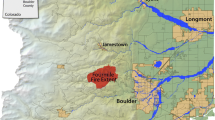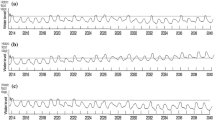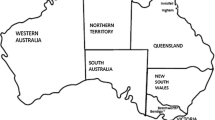Abstract
When faced with natural disasters, communities respond in diverse ways, with processes that reflect their cultures, needs, and the extent of damage incurred by the community. Because of their potentially recurring nature, floods offer an opportunity for communities to learn from and adapt to these experiences with the goal of increasing resiliency through reflection, modification of former policies, and adoption of new policies. A key component of a community’s ability to learn from disaster is how community members perceive the causes of extreme flood events and whether there is risk of future similar events. Perceptions of causes of flooding, including climate change, may be influenced by experiencing a flood event, along with individual preferences for various policies put in place to help a community recover. Using data collected from two rounds of public surveys (n = 903) across six Colorado communities flooded in 2013, we investigate whether there is variation across causal understanding of flooding, and whether this variation can be linked to differences in proximity of damages experienced (personal property, neighborhood, or community). By analyzing these variables, along with other variables (time since flood, political affiliation, and worldview), this study improves our understanding of the factors that drive our beliefs about potential causes of floods, focusing on climate change. The findings suggest that the extent of damage experienced at the neighborhood and community levels can have a significant effect on the perceptions of climate change held by the public. In turn, these beliefs about climate change are positively associated with perceptions of risks of future flooding.
Similar content being viewed by others
Notes
“Have you personally experienced flooding in your local area recently or not?” Responses: Yes/No/Do not know (Spence et al. 2011).
Greeley was not included in this resident survey due to lack of residential impact and damage in the community.
FEMA (2018) Open FEMA Dataset Housing Assistance. Accessed at https://www.fema.gov/openfema-dataset-housing-assistance-data-owners-v1 and https://www.fema.gov/openfema-dataset-housing-assistance-data-renters-v1.
References
Agyeman J, Bullard R, Evans B (2003) Just sustainabilities: development in an unequal world. Earthscan/MIT Press, London, UK
Akerlof KL, Maibach EW, Fitzgerald D, Cedeno AY, Neuman A (2013) Do people “personally experience” global warming, and if so how, and does it matter? Glob Environ Chang 23(1):81–91
Akerlof KL, Delamater PL, Boules CR, Upperman CR, Mitchell CS (2015) Vulnerable populations perceive their health as at risk from climate change. Int J Environ Res Public Health 12(12):15419–15433
Akerlof KL, Rowan KE, La Porte T, Batten BK, Ernst H, Sklarew DM (2016) Risky business: engaging the public on sea level rise and inundation. Environ Sci Pol 66:314–323
Albright EA, Crow DA (2015) Learning processes, public and stakeholder engagement: analyzing responses to Colorado’s extreme flood events of 2013. Urban Clim 14:79–93
Borick C, Rabe B (2010) A reason to believe; examining the factors that determine individual views on global warming. Soc Sci Q 91(3):777–800
Brilly M, Polic M (2005) Public perception of flood risks, flood forecasting and mitigation. Nat Hazards Earth Syst Sci 5(3):345–355
Brody SD, Zahran S, Vedlitz A, Grover H (2008) Examining the relationship between physical vulnerability and public perceptions of global climate change in the United States. Environ Behav 40(1):72–95
Coumou D, Rahmstorf S (2012) A decade of weather extremes. Nat Clim Chang 2:491–496
Demski C, Capstick SB, Pidgeon NF, Sposato R, Spence A (2017) Experience of extreme weather affects climate change mitigation and adaptation responses. Clim Chang 140:149–164
Dillman DA, Smyth JD, Christian LM (2014). Internet, phone, mail, and mixed-mode surveys: the tailored design method. John Wiley & Sons
Dunlap RE, McCright AM (2008) A widening gap: republican and democratic views on climate change. Environ Sci Policy Sustain Dev 50(5):26–35
Dunlap RE, Van Liere KD, Mertig AG, Jones RE (2000) New trends in measuring environmental attitudes: measuring endorsement of the new ecological paradigm: a revised NEP scale. J Soc Issues 56(3):425–442
Egan PJ, Mullin M (2012) Turning personal experience into political attitudes: the effect of local weather on Americans’ perceptions about global warming. J Polit 74(3):796–809
Federal Emergency Management Agency (FEMA) (2013) Colorado flooding one month later: Positive signs of recovery. Retrieved January 29, 2014, from http://www.fema.gov/news-release/2013/10/11/colorado-flooding-one-month-later-positive-signs-recovery
Fischhoff B, Slovic P, Lichtenstein S (1982) Lay foibles and expert fables in judgments about risk. Am Stat 36(3b):240–255
Flynn J, Slovic P, Mertz CK (1994) Gender, race, and perception of environmental health risks. Risk Anal 14(6):1101–1108
Godschalk DR, Brody S, Burby R (2003) Public participation in natural hazard mitigation policy formation: challenges for comprehensive planning. J Environ Plan Manag 46(5):733–754
Goebbert K, Jenkins-Smith HC, Klockow K, Nowlin MC, Silva CL (2012) Weather, climate, and worldviews: the sources and consequences of public perceptions of changes in local weather patterns. Weather Clim Soc 4(2):132–144
Henry AD (2000) Public perceptions of global warming. Hum Ecol Rev 7(1):25–30
Howe PD, Boudet H, Leiserowitz A, Maibach EW (2014) Mapping the shadow of experience of extreme weather events. Clim Chang 127(2):381–389
Intergovernmental Panel on Climate Change (IPCC) (2007) In: Pachauri RK, Reisinger A (eds) Climate change 2007: synthesis report. Cambridge Univ. Press
Johnson BB (2011) Acculturation, ethnicity, and air pollution perceptions. Risk Anal 31(6):984–999
Kahan DM (2012) Cultural cognition as a conception of the cultural theory of risk. In: Handbook of risk theory. Springer, Dordrecht, pp 725–759
Kahan DM, Braman D, Gastil J, Slovic P, Mertz CK (2007) Culture and identity-protective cognition: explaining the white-male effect in risk perception. J Empir Leg Stud 4(3):465–505
Kahneman D (2011) Thinking, fast and slow. Macmillan
Karl TR, Melillo JM, Peterson TC (2009) Global climate change impacts in the United States. Cambridge Univ Press
Kasperson RE, Renn O, Slovic P, Brown HS, Emel J, Goble R, Kasperson JX, Ratick S (1988) The social amplification of risk: a conceptual framework. Risk Anal 8(2):177–187
Kempton W, Boster JS, Hartley JA (1996) Environmental values in American culture. MIT Press
Konisky DM, Hughes L, Kaylor CH (2015) Extreme weather events and climate change concern. Clim Chang 134(4):533–547
Lindell MK, Hwang SN (2008) Household’s perceived personal risk and responses in a multihazard environment. Risk Anal 28(2):539–556
Marlon JR, van der Linden S, Howe PD, Leiserowitz A, Woo SL, Broad K (2018) Detecting local environmental change: the role of experience in shaping risk judgments about global warming. J Risk Res:1–15
Marx SM, Weber EU, Orlove BS, Leiserowitz A, Krantz DH, Roncoli C, Phillips J (2007) Communication and mental processes: experiential and analytic processing of uncertain climate information. Glob Environ Chang 17(1):47–58
McCright AM, Dunlap RE (2011a) The politicization of climate change and polarization in the American public’s views of global warming, 2001–2010. Sociol Q 52(2):155–194
McCright AM, Dunlap RE (2011b) Cool dudes: the denial of climate change among conservative white males in the United States. Glob Environ Chang 21(4):1163–1172
Meletti DS, O’Brien PW (1992) Warnings during disaster: normalizing communicated risk. Soc Probl 39:40–57
Myers TA, Maibach EW, Roser-Renouf C, Akerlof K, Leiserowitz AA (2013) The relationship between personal experience and belief in the reality of global warming. Nat Clim Chang 3(4):343–347
Nohrstedt D, Weible CM (2010) The logic of policy change after crisis: proximity and subsystem interaction. Risk Hazards Crisis Public Policy 1(2):1–32
nunes Correia F, Fordham M, da Graca Saraiva M, Bernardo F (1998) Flood hazard assessment and management: interface with the public. Wat Resour Mgmt 12(3):209–227
Ogunbode CA, Liu Y, Tausch N (2017) The moderating role of political affiliation in the link between flooding experience and preparedness to reduce energy use. Clim Chang (1–14)
Olofsson A, Rashid S (2011) The white (male) effect and risk perception: can equality make a difference? Risk Anal 31(6):1016–1032
Pew Research Center (November 2015) Global Concern about Climate Change, Broad Support for Limiting Emissions
Royston P, White I (2011) Multiple imputation by chained equations (MICE): implementation in Stata. J Stat Softw 45(4):1–20
Rubin D (1987) Multiple imputation for nonresponse in surveys. John Wiley, New York
Ruin I, Gaillard JC, Lutoff C (2007) How to get there? Assessing motorists’ flash flood risk perception on daily itineraries. Env Hazards 7(3):235–244
Sabatier PA, Weible CM (2007) The advocacy coalition framework: innovations and clarifications. In: Sabatier PA (ed) Theories of the policy process, 2nd edn. Westview, Boulder, pp 189–217
Satterfield TA, Mertz CK, Slovic P (2004) Discrimination, vulnerability, and justice in the face of risk. Risk Anal: An Int J 24(1):115–129
Shao W (2016) Are actual weather and perceived weather the same? Understanding perceptions of local weather and their effects on risk perceptions of global warming. J Risk Res 19:722–742
Sisco MR, Bosetti V, Weber EU (2017) When do extreme weather events generate attention to climate change? Clim Chang 143(1–2):227–241
Slovic P (1987) Perception of risk. Science 236(4799):280–285
Spence A, Poortinga W, Butler C, Pidgeon N (2011) Perceptions of climate change and willingness to save energy related to flood experience. Nat Clim Chang 1(April):46–49
Tierney KJ (2007) From the margins to the mainstream? Disaster research at the crossroads. Annual Rev of Soc 33:503–525
Tierney K, Lindell MK, Perry RW (2001) Facing the unexpected. Disaster preparedness and response in the United States. Joseph Henry Press, Washington, DC
Tversky A, Kahneman D (1973) Availability: a heuristic for judging frequency and probability. Cogn Psychol 5(2):207–232
Tversky A, Kahneman D (1974) Judgment under uncertainty: heuristics and biases. Science 185(4157):1124–1131
Vari A, Linnerooth-Bayer J, Ferencz Z (2003) Stakeholder views on flood risk management in Hungary’s Upper Tisza Basin. Risk Anal 23(3):585–600
Wachinger G, Renn O, Begg C, Kuhlicke C (2013) The risk perception paradox—implications for governance and communication of natural hazards. Risk Anal 33(6):1049–1065
Whitmarsh L (2008) Are flood victims more concerned about climate change than other people? The role of direct experience in risk perception and behavioural response. J Risk Res 11(3):351–374
Zanocco C, Boudet H, Nilson R, Satein H, Whitley H, Flora J (2018) Place, proximity, and perceived harm: extreme weather events and views about climate change. Clim Chang 149(3–4):349–365
Author information
Authors and Affiliations
Corresponding author
Additional information
Publisher’s note
Springer Nature remains neutral with regard to jurisdictional claims in published maps and institutional affiliations.
Electronic supplementary material
ESM 1
(DOCX 144 kb)
Rights and permissions
About this article
Cite this article
Albright, E.A., Crow, D. Beliefs about climate change in the aftermath of extreme flooding. Climatic Change 155, 1–17 (2019). https://doi.org/10.1007/s10584-019-02461-2
Received:
Accepted:
Published:
Issue Date:
DOI: https://doi.org/10.1007/s10584-019-02461-2




